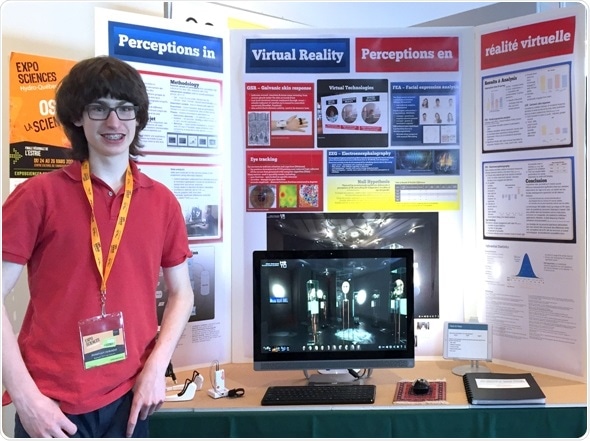Introduction
Shimmer recently supported a project undertaken by Donovan Faraoni, a Grade 10 student at Bishop’s College School, Québec, Canada. Donovan’s experiment focused on how mixed reality technologies will soon blend virtual elements seamlessly into our everyday lives, making it critical to understand potential underlying differences in our perceptions of virtual reality.

The Experiment
This experiment addresses the question: How do different groups of people react to a web-VR stimulus, based on emotional and physiological indicators? A sample of youth (=<20 years old) and adults drawn from a multi-lingual secondary school in Canada were grouped by independent variables of age and gender. Devices and software to measure facial expressions, eye tracking, brain activity and galvanic skin response, including the Shimmer3 GSR+, were used to record videos and multiple biometrics while participants interacted with a web-VR, simulated 3-D exhibition of neolithic masks, in an open-ended task including an on-line survey.
Results
Results revealed statistically significant differences using automated facial expression analysis, with youths 4.2% more aroused than adults; and females 5.9% more aroused than males.
Analysis of trends in other biometric data provided supporting evidence including galvanic (electrodermal) skin response, electroencephalography alpha-relative and beta-relative activity, eye-tracking fixations, saccades, and saccade amplitude, survey response time and correctness of answers. Overall, sufficient evidence was found to reject the null hypothesis of no statistically significant differ-ences due to independent variables of gender or age.
Conclusion
While it might be anticipated that youths raised in a digital world will have different emotional and physiological responses than adults who grew up in a physical world, this experiment uses rich biometrics to show there are also differences between females and males, regardless of age. The results indicate the need to be aware of differences in how people perceive VR, to design and live in a technological future that is accessible and inclusive of everyone.
Donovan won a number of awards for his project, including the Prix du Réseau Action Technologie In-formatique, which is first place in the Estrie Region Science Fair for research in information technology networks.